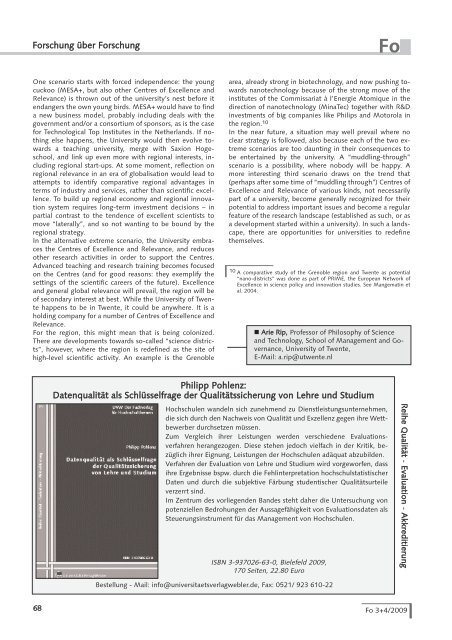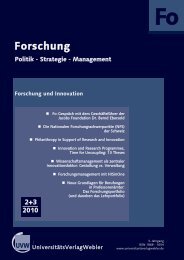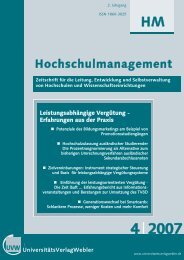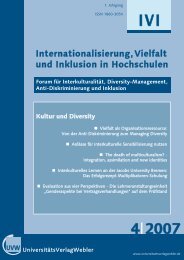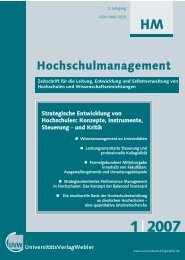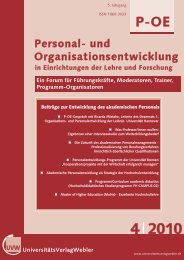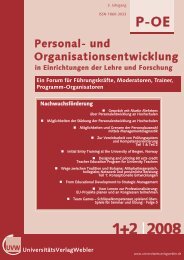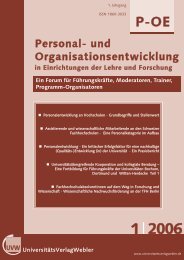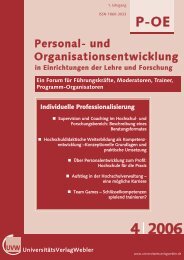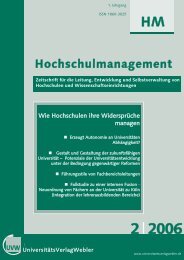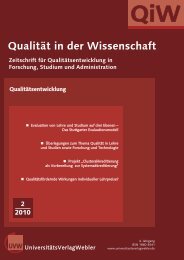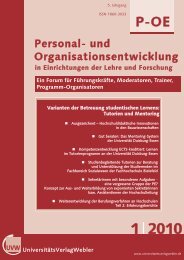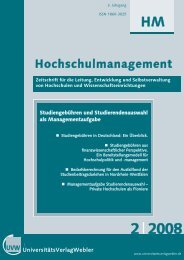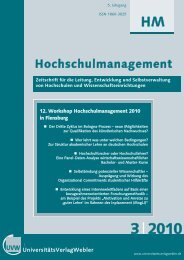Fo - UniversitätsVerlagWebler
Fo - UniversitätsVerlagWebler
Fo - UniversitätsVerlagWebler
Erfolgreiche ePaper selbst erstellen
Machen Sie aus Ihren PDF Publikationen ein blätterbares Flipbook mit unserer einzigartigen Google optimierten e-Paper Software.
<strong>Fo</strong>rschung über <strong>Fo</strong>rschung<br />
<strong>Fo</strong><br />
One scenario starts with forced independence: the young<br />
cuckoo (MESA+, but also other Centres of Excellence and<br />
Relevance) is thrown out of the university’s nest before it<br />
endangers the own young birds. MESA+ would have to find<br />
a new business model, probably including deals with the<br />
government and/or a consortium of sponsors, as is the case<br />
for Technological Top Institutes in the Netherlands. If nothing<br />
else happens, the University would then evolve towards<br />
a teaching university, merge with Saxion Hogeschool,<br />
and link up even more with regional interests, including<br />
regional start-ups. At some moment, reflection on<br />
regional relevance in an era of globalisation would lead to<br />
attempts to identify comparative regional advantages in<br />
terms of industry and services, rather than scientific excellence.<br />
To build up regional economy and regional innovation<br />
system requires long-term investment decisions – in<br />
partial contrast to the tendence of excellent scientists to<br />
move “laterally”, and so not wanting to be bound by the<br />
regional strategy.<br />
In the alternative extreme scenario, the University embraces<br />
the Centres of Excellence and Relevance, and reduces<br />
other research activities in order to support the Centres.<br />
Advanced teaching and research training becomes focused<br />
on the Centres (and for good reasons: they exemplify the<br />
settings of the scientific careers of the future). Excellence<br />
and general global relevance will prevail, the region will be<br />
of secondary interest at best. While the University of Twente<br />
happens to be in Twente, it could be anywhere. It is a<br />
holding company for a number of Centres of Excellence and<br />
Relevance.<br />
<strong>Fo</strong>r the region, this might mean that is being colonized.<br />
There are developments towards so-called “science districts”,<br />
however, where the region is redefined as the site of<br />
high-level scientific activity. An example is the Grenoble<br />
area, already strong in biotechnology, and now pushing towards<br />
nanotechnology because of the strong move of the<br />
institutes of the Commissariat à l’Energie Atomique in the<br />
direction of nanotechnology (MinaTec) together with R&D<br />
investments of big companies like Philips and Motorola in<br />
the region. 10<br />
In the near future, a situation may well prevail where no<br />
clear strategy is followed, also because each of the two extreme<br />
scenarios are too daunting in their consequences to<br />
be entertained by the university. A “muddling-through”<br />
scenario is a possibility, where nobody will be happy. A<br />
more interesting third scenario draws on the trend that<br />
(perhaps after some time of “muddling through”) Centres of<br />
Excellence and Relevance of various kinds, not necessarily<br />
part of a university, become generally recognized for their<br />
potential to address important issues and become a regular<br />
feature of the research landscape (established as such, or as<br />
a development started within a university). In such a landscape,<br />
there are opportunities for universities to redefine<br />
themselves.<br />
10 A comparative study of the Grenoble region and Twente as potential<br />
“nano-districts” was done as part of PRIME, the European Network of<br />
Excellence in science policy and innovation studies. See Mangematin et<br />
al. 2004.<br />
• Arie Rip, Professor of Philosophy of Science<br />
and Technology, School of Management and Governance,<br />
University of Twente,<br />
E-Mail: a.rip@utwente.nl<br />
Philipp Pohlenz:<br />
Datenqualität als Schlüsselfrage der Qualitätssicherung von Lehre und Studium<br />
Hochschulen wandeln sich zunehmend zu Dienstleistungsunternehmen,<br />
die sich durch den Nachweis von Qualität und Exzellenz gegen ihre Wettbewerber<br />
durchsetzen müssen.<br />
Zum Vergleich ihrer Leistungen werden verschiedene Evaluationsverfahren<br />
herangezogen. Diese stehen jedoch vielfach in der Kritik, bezüglich<br />
ihrer Eignung, Leistungen der Hochschulen adäquat abzubilden.<br />
Verfahren der Evaluation von Lehre und Studium wird vorgeworfen, dass<br />
ihre Ergebnisse bspw. durch die Fehlinterpretation hochschulstatistischer<br />
Daten und durch die subjektive Färbung studentischer Qualitätsurteile<br />
verzerrt sind.<br />
Im Zentrum des vorliegenden Bandes steht daher die Untersuchung von<br />
potenziellen Bedrohungen der Aussagefähigkeit von Evaluationsdaten als<br />
Steuerungsinstrument für das Management von Hochschulen.<br />
ISBN 3-937026-63-0, Bielefeld 2009,<br />
170 Seiten, 22.80 Euro<br />
Reihe Qualität - Evaluation - Akkreditierung<br />
Bestellung - Mail: info@universitaetsverlagwebler.de, Fax: 0521/ 923 610-22<br />
68 <strong>Fo</strong> 3+4/2009


